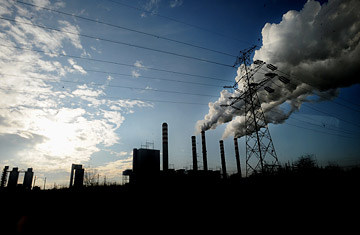
Smoke rises from the chimneys of the Patnow power plant near Konin in central Poland
For years, the fight against global warming has been an article of faith in the European Union. But a looming recession, expensive bank bailouts and anxious warnings from embattled industries are raising questions about how closely Europe can stick to its climate-change creed.
The E.U. is set to face its moment of truth at a summit in Brussels tomorrow, when French President Nicolas Sarkozy will attempt to cajole his fellow leaders into agreeing on an ambitious package of emission-cutting measures. The so-called 20-20-20 plan aims to reduce 20% of greenhouse gases by 2020, compared with 1990 levels, raise renewable energy's share of the market to 20% and cut overall energy consumption by 20%. (Read TIME's Heroes of the Environment 2008.)
Sarkozy hopes to crown France's six-month presidency of the E.U. with a deal on the policies needed to meet these targets, but he will have to muster all of his Gallic charm to overcome resistance from former East bloc countries, which rely on heavily polluting coal-fired plants for energy.
Countries like Poland and the Czech Republic oppose deep cuts in carbon-dioxide emissions, arguing that they do not account for their lower levels of earnings. But Sarkozy has warned that the E.U.'s credibility is at stake as it aims to set an example in the run-up to a new global climate pact that will be signed in Copenhagen next year.
Warsaw is leading the resistance to the E.U. emissions cuts: according to World Coal Institute figures for 2007, Poland, which produces 94% of its electricity from coal, is second only to South Africa in its dependence on the fuel.
But even older E.U. members are getting cold feet about the 20-20-20 plan. Last week Germany successfully persuaded fellow governments to agree to a later deadline for a separate deal on car-emission levels. Along with Italy, Germany is also battling efforts to make industries pay for permits to pollute through the E.U.'s Emissions Trading Scheme (ETS). Berlin and Rome are backed by BusinessEurope, a club of industrial associations, which claims that whole swaths of Europe's manufacturing sector will move their production out of the E.U. if auctioning of emission permits is introduced.
The tensions reflect the fraying European consensus on climate change. Many countries have been wary of the costs that unilateral E.U. action to reduce emissions would entail, arguing that Europe should act only when all of the world's major greenhouse-gas producers make corresponding pledges.
There is no doubt that the plans are expensive: some estimates predict that the 20-20-20 goal could cost the E.U. up to $80 billion a year, or 0.5% of its gross domestic product, although officials and green activists insist that the price is worth paying for energy security and a cleaner world. (See TIME's special report on the environment.)
"If Europe is to persuade the U.S. and emerging economic powers like China and India to take similar action, it has to back up its rhetoric with action," says Simon Tilford, chief economist at the London-based Centre for European Reform. "If the E.U. retreats from its leading position on climate policy, it will surrender its first-mover advantage and, with it, the chance to make European firms leaders in key environmental technologies."
European Commission president José Manuel Barroso has explicitly rejected suggestions that the economic crisis means the E.U. cannot afford to save energy and tackle climate change. "Climate action, energy security and economic growth can and must be pursued in a mutually supportive way," he said on Tuesday. "It would be a real mistake for Europe to give the signal that we are watering down our position after all these years leading the efforts for a global solution now that others, like the Americans, are coming closer to our position."
Until the recent financial meltdown, the mantra has been that the money to tackle climate change needed to come from private investors, but Barroso argues that governments should lead the spending efforts.
"We should expect climate change to progressively become the area to which government spending will be directed," says Christian Egenhofer, senior fellow at the Centre for European Policy Studies in Brussels. He points to recent German government tax-incentive plans to spur consumption of cleaner cars and green appliances. And he says climate change could become a primary revenue source through emission permits. "If emissions rights are auctioned, governments will be able to collect at least €30 billion ($38.9 billion) annually from 2012 onwards," Egenhofer says. "By 2020, it could reach up to €90 billion ($116.8 billion) annually."
That may sound like a persuasive argument to doubters. But in these nervous times, governments have become reluctant to commit to any measures that leave their budgets even more exposed. It may simply come down to how well Sarkozy can butter up his fellow leaders.
